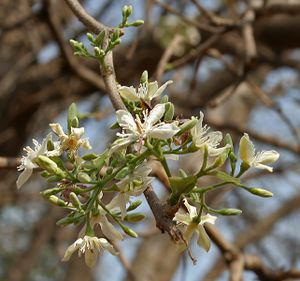Note: This is a project under development. The articles on this wiki are just being initiated and broadly incomplete. You can Help creating new pages.
Wrightia tinctoria - Svetakutaja
Shwetha kutaja, Pala indigo plant or dyers’s oleander, is a flowering plant species in the genus Wrightia found in India, southeast Asia and Australia. It is found in dry and moist regions in its distribution. Various parts of the plant have medicinal properties.
The flowers, leaves, fruits and seeds are edible. The tree is harvested from the wild as a medicine and source of a dye and wood. Leaves are extracted as fodder for livestock. The leaves, flowers, fruits and roots are sources of indigo-yielding glucoside, which produces a blue dye or indigo- like dye. About 100 - 200 kilos of leaves are needed to prepare 1 kilo of dye. It is occasionally planted as an ornamental in the tropics. The branches are trampled into the puddle soil in rice field for green manuring
It is a medicinal plant in Ayurveda described in classical Ayurvedic texts as Shwetha kutaja and seeds known as Indrayava. It is also known from Unani and Siddha systems as Inderjao shireen and Irum-paalai respectively. According to Ayurveda, the bark is useful in treatment of diarrhoea, piles, ringworm[10] and other skin diseases. Seeds also have anti-dysenteric properties and are also used as astringents, antihelminthics, aphrodisiacs and to reduce fevers. Laddus made of baked seeds has been described as a remedy for improving libido. Bark and seeds are used to treat flatulence. Root bark extract is used orally as an antidote for snakebite. Powder of the bark is also used for treatment of kidney stones. Its stem bark extract is used in animals for the treatment of Anthrax. The oil we get after the leaves are exposed in sunlight in pure coconut oil is good for scaly and itching scalp and other parts of body.
